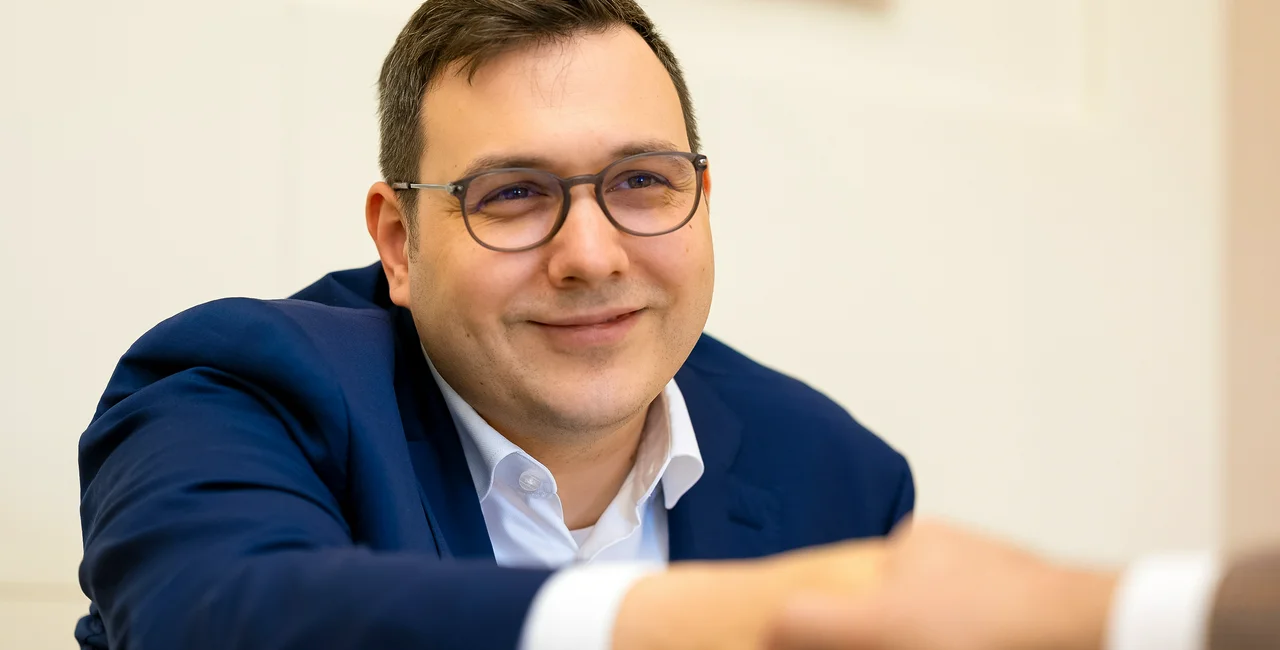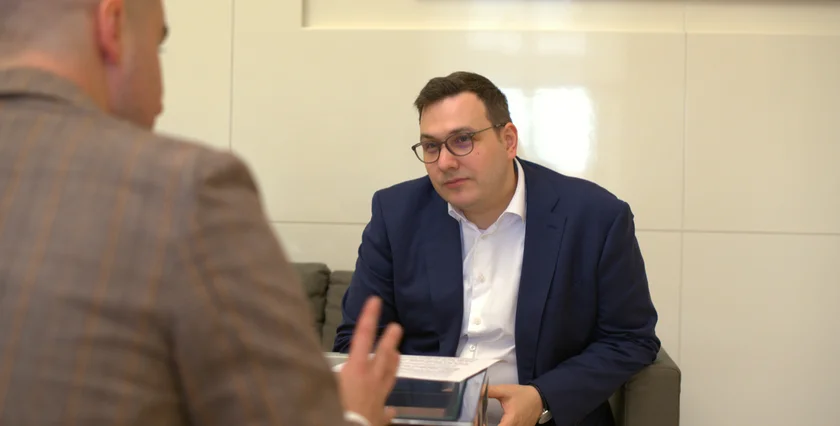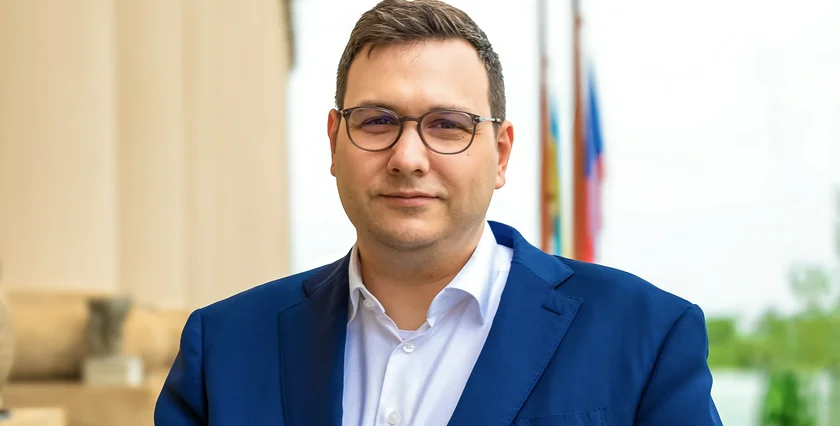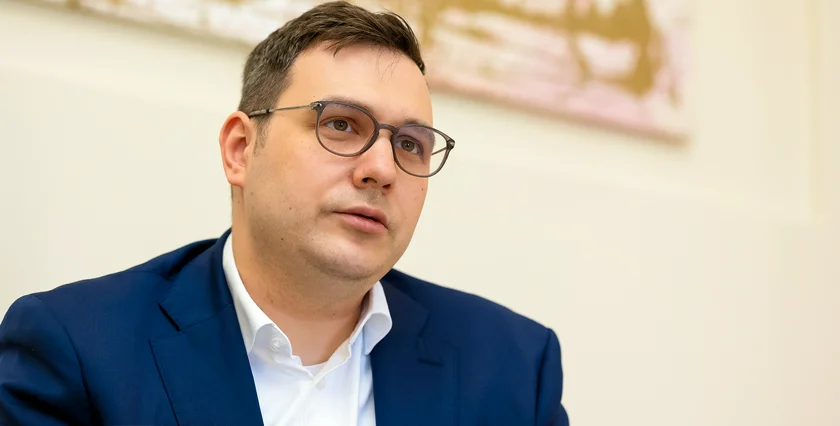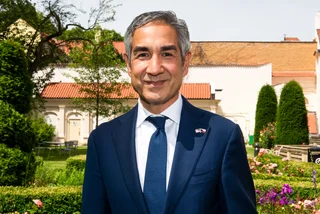Jan Lipavský has no easy job.
As Czechia’s Minister of Foreign Affairs since late 2021, he has led and overseen Czechia’s response to Russia’s full-scale invasion of Ukraine, managed key political issues on a European level – such as migration – and met and negotiated with senior world politicians while visiting tens of countries around the globe, representing Czechia on the international stage.
Having met U.S. President Joe Biden, Ukrainian President Volodymyr Zelenskyy, French President Emmanuel Macron, NATO Secretary-General Jens Stoltenberg, and a host of other world leaders at home and abroad, the 39-year-old has picked up a wealth of experience in the political field.
Expats.cz sat down with the territorial studies graduate – and former project manager in the IT world – to gain his valuable insight and experiences in performing one of Czechia’s highest-pressure jobs.
In addition to recounting some intriguing parts of his time as foreign minister, Lipavský also gives valuable insight into how he views Czechia’s current standing on the world stage, the country’s biggest dangers, and the main pieces of advice he would give to any aspiring diplomat.
This interview has been edited for clarity and length.
Since you became foreign minister, you have been very busy. Did you expect this when you got the job – Czechia getting ‘under the skin’ of a major superpower like Russia?
When I began my role, I did not expect most of my work in the ministry to occur during the biggest period of conflict in Europe since the end of World War II.
The security situation in autumn 2021, when our new government assumed office, was not good. We could see signs of trouble growing, but nobody expected a full-scale war to break out.
I was not expecting such a complicated security environment and non-stop role. Now, we need to channel a lot of energy into supporting Ukraine and helping protect the West from Russia.
As foreign minister, what are the most important things you have achieved?
Signing into law the Magntisky Act [allowing the Czech Republic to impose sanctions on anyone who violated human rights outside of the EU] was a huge success.
Currently, we are bearing the fruits of that law and can sanction different entities like the Voice of Europe [a pro-Russia media platform]. We are also promoting the Magntisky Act in the EU.
Czechia's return to the main stage of the international scene is also a big deal. In late May, we organized a huge event – a meeting of NATO foreign ministers – in Prague, which saw around 30 international, key ministers attend.
There are also small things that make me happy. For example, we have a new method of marking Czech humanitarian and development aid—it now has a Czech flag and text. This makes it visible to the whole world and shows how Czechia helps others.
Speaking of world relations, building connections across cultures is crucial in diplomacy. Which strategies have you found effective in fostering cooperation with people from different backgrounds?
I think everything begins with respect.
"You need to respect your counterpart. It’s not important from which environment, culture, or political platform they come from – respect is one of the most basic ways to create conditions for successful negotiations."
And then, of course, it helps to understand your partner: the dos and don’ts in the political and cultural context.
It also works vice versa. The person you are meeting is thinking about your views, culture, and perception of things. This makes things easier.
With common respect, you can easily overcome any misunderstandings that may happen.
You’ve visited many countries on different continents. Have you had any awkward cultural experiences or misunderstandings?
Not really.
Usually, everything is prepared by remembering and following protocol. It is very formal – I get briefed on what to know and expect when I visit somewhere.
And – honestly – diplomacy works in a way in which there’s a certain standard of how things happen and how they are organized, so there’s not much room for some things to go massively wrong.
Diplomacy involves constant learning and adaptation. What have been some of the most valuable lessons you’ve learned throughout your diplomatic career?
Patience.
It is important to begin by understanding what needs to be achieved – this can come from government deliberation or the needs of institutions. This understanding helps create a framework and provides clear guidance for negotiating with different positions.
In the long term, a deep understanding of our interests and partners' interests can lead to successful results.
"Achieving something in foreign policy often involves addressing a threat or problem endangering our country, which requires patience and a thorough understanding of the situation."
And how do you manage disagreements with political opponents and allies?
This is a very personal question – each politician has a different way of navigating conflict.
For me, the first step is to have a common understanding of each side’s position. This allows for the opportunity to find a common denominator.
"Sometimes, a polite word is enough to change someone’s opinion or stance – or to find a type of compromise at least."
I also try to speak slowly but surely about things that I consider important and find others who will support me. On the EU level, I try to hear the other side and see what we can work with.
I am very lucky because our coalition government has a strong, coherent position on foreign affairs. All five parties agree on most agendas, so I don’t have to solve too many clashes.
The Israel-Palestine war has sparked a lot of discord and talking points. How will Czechia continue to support the humanitarian situation in the region?
Czechia will continue to support the humanitarian situation in Israel and Palestine by providing aid packages to Gaza, which we believe is crucial in this ongoing conflict. For example, I have signed multiple humanitarian help packages for the area. We are also involved in multiple international aid projects.
President Petr Pavel is also actively involved in the international scene, and we are actively monitoring the situation within multilateral organizations.
Our position is always to stand by international and humanitarian law principles.
In terms of recognizing Palestine, what is the current governmental position?
Although communist Czechoslovakia recognized Palestinian statehood in 1988, at the moment, we believe that recognizing Palestine as a true state should solely come from a process of peace negotiations between the actors in the region.
"Currently, I don’t see how Czechia’s recognition of Palestine would be helpful. However, that doesn’t exclude us from advocating a two-state solution."
We had the European Parliament elections in early June. Why are they important for Czech and EU citizens?
Czech society is becoming more familiar with and engaged in EU elections. Although voter turnout may not be as high as in some other countries, participation has increased over the years.
People now see the importance of discussions and decisions taking place in Brussels, especially regarding topics like security policy.
Although EU elections are not as important as national parliamentary elections, it is still crucial for citizens to have a voice in the European Parliament. Every person’s vote and contribution can significantly impact important legislation and negotiations [that take place there].
English is widely spoken across the EU and in your role. You have very good English – how did you learn it so well?
I don’t want to “grade” myself in terms of proficiency! One can always do things better – sometimes I jumble my sentences in quite a funny way.
But I would say it was through the continued study of English and using it very often as a young person.
Spending two semesters during my university studies in the UK [in Canterbury, southeast England] was a big factor. This boosted my English skills.
However, my German and Russian language skills are not good enough to use in the international scene or business environment. I hope that one day, I will have time to improve in both.

Do you think all Czech politicians should have a basic command of English?
I consider language to be a vital tool for any politician’s work. It’s always important to have a good command of English – it helps you reach further in almost any political or diplomatic activity you do.
As foreign minister, you must take many flights. How do you recover from long-haul journeys?
I sleep!
On the flight or after?
Yes, after, for sure.
Australia is also a good example. Traveling takes at least three to four days of the entire trip: one day to get to it, one day for the return trip, and one to two days for adjusting to the time zone.
This can be quite taxing on one’s body and requires proper recovery time.
And how many countries do you tend to visit per month?
It differs, honestly, and depends on where I fly.
It's easy to travel across Europe because every trip is under two or three hours.
Traveling to Africa, Asia, or the Americas is much more complicated.
It also depends on how my month looks and how many events I have here in Czechia. Sometimes, people travel to me rather than me to them!
🇨🇿ðŸ¤ðŸ‡«ðŸ‡· Jsem rád, že jsem dnes mohl uvÃtat prezidenta @EmmanuelMacron u nás v srdci Evropy.
— Jan Lipavský (@JanLipavsky) March 5, 2024
VěřÃm, že tato návÅ¡tÄ›va prohloubà naÅ¡i spolupráci. pic.twitter.com/tTxiHhdMQu
And do you have a favorite country you have been to?
Yes, of course – it is called Czechia!
How do you unwind during your free time? How much free time do you get and what can you do?
I have days that are purely dedicated to my personal time; those are enough to recover.
Initially, in the role, I was overstretching myself, and I could feel this was not healthy. So, I’m trying to pay more attention to my body so that I can continue to do what I do.
From your own experience, what advice would you give to aspiring diplomats or young professionals who want to enter diplomacy, politics, or international relations?
I often speak with high school and university students about this.
"The one thing I always recommend is to pay attention to studying language. It is one of the key requirements for working at any Foreign Ministry."
This doesn’t only apply to English, but also – for example – to French, if you want to work in Brussels, where it is one of the working languages. German, Spanish, and Portuguese are also important. If you want to specialize in those [Eastern] regions, Chinese and Arabic can be necessities.
It’s also very important to have an active interest in the politics of trade, international politics, and security affairs.
Joining diplomatic academies and programs for students at a country’s Foreign Affairs Ministry is also a great way to start.
Finally, in the next six to 12 months, what are the biggest priorities and challenges for you and Czechia?
Above all, we have to continue to help Ukraine and contain Russian aggression. I will be calling other leaders and countries to help stop Russia’s actions.
The topic of migration in Europe – especially in the context of the recent European Parliament elections – will continue to be a major focus.












 Reading time: 8 minutes
Reading time: 8 minutes 